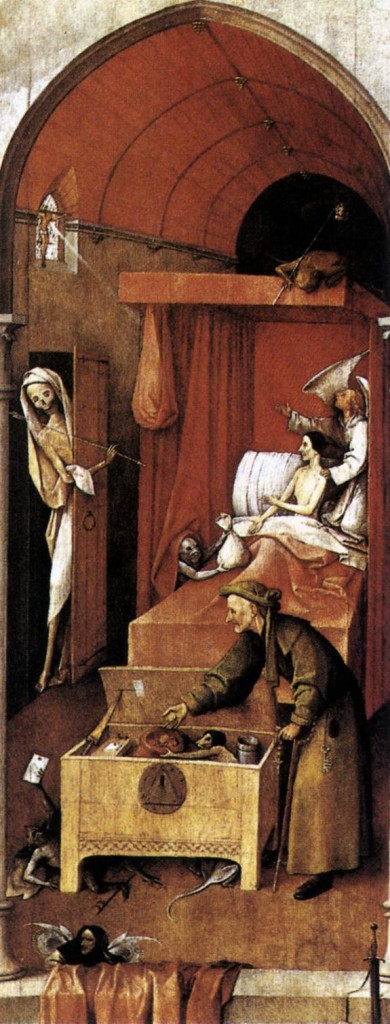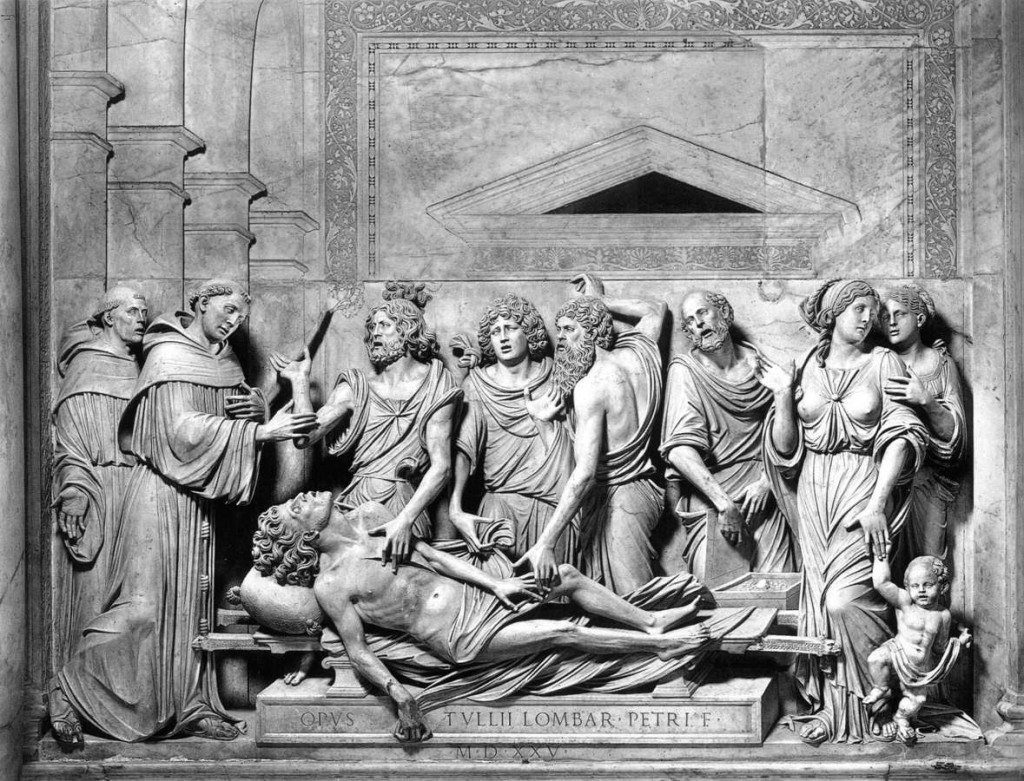… Facts of culture. We tend to mix up the two. The fallacy being that we are always more preoccupied with our obstacles than the objects we are trying to reach. When up is down and east is west, when nature is nurture and gifts of nature become facts of culture. To Slavoj Zizek, most of us in the West are “melancholic” subjects, unable to mourn through a form of catharsis and transform ourselves and society; we are like the proverbial miser; and individual who possesses the object, but has completely lost sight the causes and motivations that aroused such desire. A society of tragic figures who have access to much they want, but find no satisfaction in them. As if the miser’s trunk of gold is empty and the shiny bounty is only a hologram.

---In this slender panel, probably a wing from a larger altarpiece, a dying man seems torn between salvation and his own avarice. At the foot of the bed a younger man, possibly the miser at an earlier age, hypocritically throws coins into a chest with one hand as he fingers a rosary with the other. In his last hour, with death literally at the door, the miser still hesitates; will he reach for the demon's bag of gold or will he follow the angel's gesture and direct his final thoughts to the crucifix in the window?---Read More:http://www.nga.gov/collection/gallery/gg39/gg39-41645.html
( see link at end) : Slavoj Zizek: For Rousseau, an evil person is NOT an egotist, “thinking only about his own interests”: a true egotist is all too busy with taking care of his own good to have time to cause misfortunes to others, while the primary vice of a bad person is precisely that he is more occupied with others than with himself. Rousseau describes here a precise libidinal mechanism: the inversion which generates the shift of the libidinal investment from the object to the obstacle itself. This is why egalitarianism itself should never be accepted at its face value: the notion (and practice) of egalitarian justice, insofar as it is sustained by envy, relies on the inversion of the standard renunciation accomplished to benefit others: “I am ready to renounce it, so that others will (also) NOT (be able to) have it!” Far from being opposed to the spirit of sacrifice, Evil is thus the very spirit of sacrifice, ready to ignore one’s own well-being – if, through my sacrifice, I can deprive the Other of his jouissance… Is this sad fact that the opposition to the system cannot articulate itself in the guise of a realistic alternative, or at least a meaningful utopian project, but only as a meaningless outburst, not the strongest indictment of our predicament? Where is here the celebrated freedom of choice, when the only choice is the one between playing by the rules and (self-)destructive violence, a violence which is almost exclusively directed against one’s own – the cars burned and the schools torched were not from rich neighborhoods, but were part of the hard-won acquisitions of the very strata from which protesters originate.Read More:http://www.lacan.com/zizfrance1.htm

---Tullio Lombardo. ---Miracle of the Miser's Heart 1520 - 1525 Basilica di Sant'Antonio, Padua, Italy Sculpture, Marble, 130 x 245 cm ---Read More:http://www.friendsofart.net/en/art/tullio-lombardo/miracle-of-the-misers-heart
The assertion Zizek poses is that the only legitimate source of conflict we have is cultural or natural ethnic tension. In our present “clash of civilizations” to use Sam Huntington’s phrase, our willingness to mix up gifts of nature with facts of culture has been the avoidable but convenient pretext for Zizek’s “meaningless outbursts.”
ADDENDUM:
Aesop. The Miser:
A miser sold all that he had and bought a lump of gold, which he buried in a hole in the ground by the side of an old wall and went to look at daily. One of his workmen observed his frequent visits to the spot and decided to watch his movements. He soon discovered the secret of the hidden treasure, and digging down, came to the lump of gold, and stole it. The Miser, on his next visit, found the hole empty and began to tear his hair and to make loud lamentations. A neighbor, seeing him overcome with grief and learning the cause, said, “Pray do not grieve so; but go and take a stone, and place it in the hole, and fancy that the gold is still lying there. It will do you quite the same service; for when the gold was there, you had it not, as you did not make the slightest use of it.”








 COMMENTS
COMMENTS



